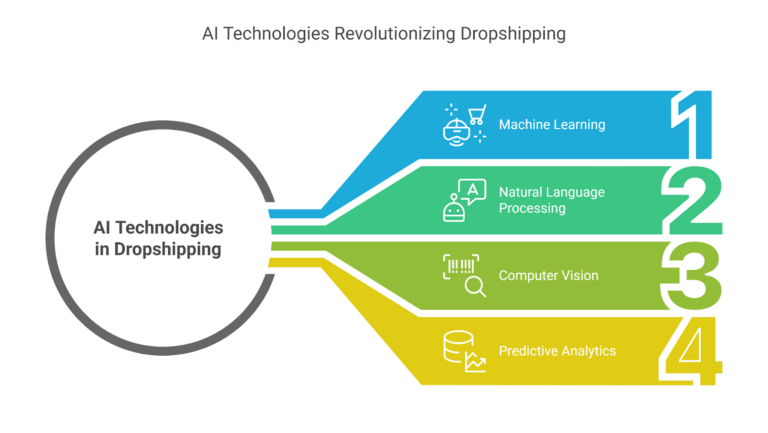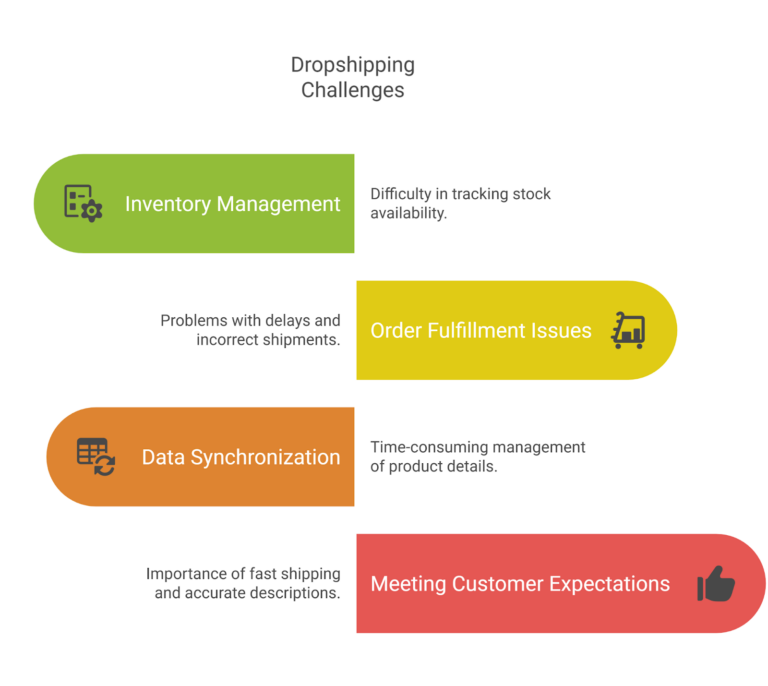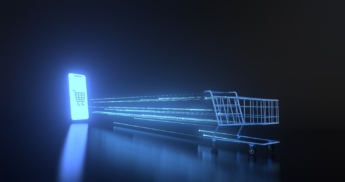Greetings! I'm Aneesh Sreedharan, CEO of 2Hats Logic Solutions. At 2Hats Logic Solutions, we are dedicated to providing technical expertise and resolving your concerns in the world of technology. Our blog page serves as a resource where we share insights and experiences, offering valuable perspectives on your queries.

Quick Summary
AI is transforming dropshipping in 2025 by optimising product research, automating customer support, and enhancing pricing strategies. AI-driven tools improve ad targeting, streamline inventory management, and enable private-label opportunities, helping businesses scale efficiently. Additionally, AI strengthens fraud prevention and ensures secure transactions, making dropshipping more profitable and sustainable. By leveraging AI and automation, dropshippers can enhance efficiency, reduce costs, and stay competitive in the evolving e-commerce landscape.
Starting dropshipping without AI in 2025 is like bringing a butter knife to a gunfight. Most new entrepreneurs fail, stuck with manual tasks while competitors automate everything for efficiency.
The old dropshipping model is outdated, causing overwork, inventory issues, and constant shipping delays. AI helps predict trends, eliminate inventory problems, and enhance customer experiences effortlessly.
This isn’t about fancy tech, it’s about survival in an increasingly competitive market. This guide will explore how AI transforms dropshipping and why adapting now is essential.
What is Dropshipping?
Dropshipping is an e-commerce business model where store owners sell products without holding inventory. When a customer orders, the supplier ships the product directly to the buyer. This model allows businesses to operate with low upfront costs and minimal risk.
Understanding AI’s Role in Dropshipping
AI transforms dropshipping by automating processes, improving decision-making, and enhancing customer experiences. Traditional dropshipping requires manual effort for product selection, pricing, and support, but AI simplifies these tasks.
How Does AI Enhance Dropshipping Efficiency?
AI automates key processes, reducing manual effort and improving speed, accuracy, and profitability.
- Automated Product Research: AI tools analyse trends and demand to find profitable, low-competition products.
- Dynamic Pricing Optimization: AI adjusts product prices based on competition, demand, and profit margins.
- Intelligent Order Fulfillment: AI selects the fastest and most cost-effective suppliers for order processing.
- Personalised Customer Experience: AI-driven chatbots and recommendation engines increase engagement and conversions.
Key AI Technologies Transforming Dropshipping?
Advanced AI technologies optimise product selection, pricing, fulfillment, and customer interactions for smooth operations.

- Machine Learning (ML): Predicts sales trends and optimises inventory based on real-time data insights.
- Natural Language Processing (NLP): AI chatbots improve customer interactions through automated and human-like responses.
- Computer Vision: AI analyses product images to improve search accuracy and detect counterfeit listings.
- Predictive Analytics: AI forecasts demand, helping dropshippers make informed and data-driven business decisions.
Challenges in Dropshipping
Despite its advantages, dropshipping comes with several challenges:

- Inventory Management: Since businesses don’t control stock, tracking availability across multiple suppliers can be difficult.
- Order Fulfillment Issues: Delays, incorrect shipments, and out-of-stock products can negatively impact customer satisfaction.
- Data Synchronization: Managing pricing, inventory, and product details across multiple platforms can be time-consuming.
- Meeting Customer Expectations: Consumers demand fast shipping, accurate product descriptions, and seamless return policies.
AI and automation help solve these challenges by streamlining operations, reducing errors, and improving overall efficiency in dropshipping.
AI-Powered Tools and Technologies for Dropshipping
AI tools simplify product research, pricing, fulfillment, and customer support for dropshipping businesses. These tools analyse market trends, automate processes, and improve decision-making for better profitability.
1. AI in Product Research & Selection
AI-driven insights help dropshippers identify trending products, forecast demand, and stay ahead of competitors.
AI Tools for Trending Product Identification
AI analyses global shopping trends, social media insights, and sales data to discover in-demand products. It detects rising trends before they become mainstream, helping dropshippers gain an early advantage.
Warning: AI tools predict trends, but customer preferences can change rapidly. Stay adaptable to market shifts.
Demand Forecasting for Profitable Product Selection
AI predicts future demand by examining past sales trends, customer preferences, and seasonal fluctuations. It processes vast amounts of data to identify patterns that indicate profitable product opportunities.
This enables dropshippers to stock trending products at the right time and maximise revenue.
AI-powered competitor Analysis
AI tracks competitor pricing, product listings, and customer reviews to refine pricing and sales strategies. It monitors market trends to help businesses stay competitive and adjust strategies accordingly.
By analysing customer sentiment, AI also reveals competitor weaknesses, creating opportunities for differentiation.
2. AI-Powered Customer Experience & Support
AI enhances customer interactions, personalises shopping experiences, and analyses feedback to improve satisfaction and retention.
AI Chatbots for Instant Customer Interaction
AI-powered chatbots handle customer inquiries, process orders, and provide support 24/7 with instant responses. They use natural language processing to understand customer concerns and provide relevant solutions.
By reducing response times, chatbots improve customer satisfaction and increase conversion rates for businesses.
Pro Tip: Train your chatbot with real customer queries to improve accuracy and reduce miscommunication.
Personalised Product Recommendations Using AI
AI studies customer behavior, past purchases, and browsing history to suggest highly relevant product recommendations. It customises recommendations in real-time, increasing engagement and encouraging repeat purchases.
By analysing customer preferences, AI helps businesses tailor promotions and offers for higher conversions.
AI-Driven Sentiment Analysis for Customer Feedback
AI scans product reviews, social media, and support tickets to detect customer satisfaction and concerns. It identifies positive and negative sentiments, allowing businesses to refine products and improve services.
By understanding customer emotions, AI helps brands build trust and enhance long-term customer relationships.
3. AI & Supply Chain Optimization
AI streamlines inventory, supplier selection, and logistics to enhance efficiency, reduce costs, and ensure timely deliveries.
Automated Inventory Management
AI predicts stock demand, prevents shortages, and automates restocking by analysing real-time sales data. It eliminates human errors in inventory tracking, reducing the risk of overstocking or understocking.
This ensures that businesses maintain optimal inventory levels while minimising operational costs and losses.
AI-Powered Supplier Vetting and Selection
AI evaluates suppliers based on delivery reliability, pricing trends, and customer satisfaction scores. It compares multiple suppliers to find the best quality products at competitive prices.
Predictive Analytics for Delivery Time Optimization
AI forecasts shipping delays, suggests faster routes, and enhances logistics efficiency for timely deliveries. It factors in weather conditions, shipping carrier performance, and traffic patterns for better accuracy.
By optimising delivery timelines, AI helps businesses improve customer satisfaction and retention rates.
4. AI- Driven Marketing & Sales Automation
AI enhances marketing efficiency by personalising campaigns, optimising pricing, and automating content creation for higher conversions.
AI in Personalised Email & Ad Campaigns
AI segments customers, personalises emails, and optimises ad placements for higher engagement and conversions. It analyses user interactions to determine the best timing and content for maximum impact.
By automating campaigns, AI improves marketing efficiency and reduces ad spend waste.
AI-Powered Dynamic Pricing Strategies
AI adjusts product prices dynamically based on competitor pricing, demand trends, and customer behavior. It ensures that pricing remains competitive while maximising profit margins in fluctuating market conditions.
By responding instantly to market changes, AI helps businesses maintain an edge over competitors.
Pro Tip: Use AI to test pricing strategies and identify the sweet spot for maximum profit.
ChatGPT & AI Copywriting for Product Descriptions
AI creates SEO-friendly, persuasive product descriptions that increase visibility and boost sales conversions. It generates compelling, keyword-optimised content tailored to different customer segments.
By maintaining consistency and accuracy, AI helps businesses scale their product listings effortlessly.
Best AI Tools for Dropshipping
AI is transforming dropshipping for Shopware merchants, making processes more efficient and boosting conversions. Here are the top AI tools to integrate into your Shopware store:
1. Google Gemini: AI-Powered Content Creation
Boost your Shopware store’s SEO with Google Gemini. This AI tool helps generate high-quality blog posts, product descriptions, and marketing content, enhancing your online visibility and authority.
2. CustomGPT.ai: AI Chatbots for Customer Support
Enhance customer interactions with CustomGPT.ai. This tool allows you to create personalised AI-driven chatbots that provide instant responses, improving engagement and reducing support workload.
3. Looka: AI-Powered Branding & Logo Design
Create a professional brand identity with Looka. Its AI-based logo maker and branding kit help maintain consistency across your Shopware store, social media, and marketing materials.
4. Browse AI: Competitor Research & Market Analysis
Gain a competitive edge with Browse AI. This tool extracts data from competitor stores, trending products, and market insights, helping you make informed business decisions.
Pro Tip: Combine AI Tools for Maximum Efficiency. Use AI chatbots alongside AI-driven analytics to personalise marketing and improve conversions.
5. Flair: AI-Enhanced Product Photography
Stand out in the competitive dropshipping market with Flair. This AI tool lets you remove backgrounds, customise product images, and create visually appealing listings without expensive photoshoots.
Conclusion
The dropshipping landscape of 2025 bears little resemblance to what worked even a year ago. Those who continue to rely solely on manual processes and outdated strategies will inevitably be left behind.
This is where partnering with 2Hats Logic creates a decisive advantage. Our AI-powered dropshipping solutions bridge the gap between cutting-edge technology and practical implementation. They enable you to compete with larger operations without massive overhead or technical expertise.
The future of dropshipping belongs to those who harness AI’s power now. With 2Hats Logic as your partner, you won’t just survive in this new era, you’ll thrive in it.
FAQ
How will AI transform dropshipping in 2025?
AI optimises product research, pricing, ad targeting, customer support, and supply chain management. It enhances efficiency, reduces costs, and improves scalability for dropshipping businesses.
Can AI improve customer support for dropshipping businesses?
AI-powered chatbots provide 24/7 support, handle FAQs, process returns, and offer personalised recommendations. This reduces response times and enhances customer satisfaction.
What role does AI play in advertising for dropshipping?
AI improves ad targeting by analysing user engagement and adjusting campaigns for better conversions. It helps dropshippers maximise ROAS (Return on Ad Spend) and reduce marketing costs.
What are the biggest benefits of using AI in dropshipping?
AI increases efficiency, reduces costs, improves scalability, and enhances customer experience. It will give dropshipping businesses a competitive edge in 2025.
Is AI necessary for a successful dropshipping business?
Yes, AI is essential for staying competitive and automating repetitive tasks. Dropshipping businesses that leverage AI gain a significant advantage in the evolving eCommerce market.

Related Articles






